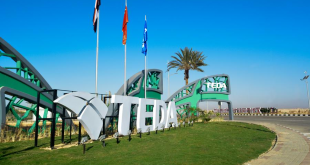Published: April 23,2025

The recent tariff policies implemented by the United States have dealt asignificant blow to the global trade system, with African nations bearingadisproportionate share of the impact. According to tracking analysis by theUnited Nations Conference on Trade and Development (UNCTAD), Africa’soverall dependence on imported intermediate goods for manufacturingremained high in 2024, at 44–47%, with Sub-Saharan Africa reaching as highas 51%—well above the global average. This structural dependency rendersAfrican economies particularly vulnerable to U.S. tariff barriers, promptingAfrican countries to reassess their development strategies and elevate
economic autonomy as a strategic priority.
South-South Cooperation: Building New Development PartnershipsIn this context, deepening South-South cooperation with emerging
economies such as China has taken on unprecedented strategic importance. China-Africa trade ballooned from USD 87 billion in 2000 to USD300 billionin2024, a year-on-year increase of 14.2% . Cooperation projects under theForum on China-Africa Cooperation (FOCAC) have delivered tangible results, cultivating over 200 landmark projects in infrastructure connectivity, industrial
capacity cooperation, and the digital economy—providing sustained
momentum for Africa’s industrialization. Notably, following the BRICSexpansion, African member states such as Egypt and Ethiopia have gainedaccess to broader platforms for international cooperation and begun toarticulate an “African voice” on critical issues such as energy security, foodsecurity, and reform of the international financial system. This has injectednew institutional vitality into South-South cooperation.
The African Continental Free Trade Area: A Critical Lever for ReshapingRegional Economic Structures
The destructive impact of the U.S.’s unilateral tariff policies on global valuechains has directly constrained Africa’s industrialization efforts. Africancountries must urgently advance regional integration to build more resilient
economic systems. The implementation of the African Continental Free TradeArea (AfCFTA) is a critical lever for reshaping the regional economic
landscape, with strategic significance in three dimensions: First, it can
substantially increase intra-African trade, which currently accounts for only17% of the continent’s total trade—far below other regions; second, it
reduces dependence on Western markets and enhances collective bargainingpower; third, it provides an institutional framework to draw lessons fromChina’s “dual circulation” development model. If the vast market potential of
Africa’s 1.4 billion people is fully activated, it could fundamentally alter thecontinent’s passive role in the global division of labor.
Multilateralism and Strategic Autonomy: The Path Forward for AfricanDevelopment
As the WTO framework faces mounting challenges, African countries must
uphold the principles of multilateralism while strengthening their sense of
strategic autonomy. The successful practices of the Forumon China-AfricaCooperation demonstrate that developing countries can achieve mutual
benefit and win-win outcomes through institutionalized collaboration. At
present, Africa should accelerate the advancement of the AfCFTA, integratingits 54 fragmented economies into a unified regional market. Historical
experience shows that only by strengthening South-South cooperationanddeepening regional integration can Africa effectively withstand the shocksof
unilateralism and gain a voice in global economic governance commensuratewith its scale. Especially during this critical period of global value chainrestructuring, African countries must seize the opportunity to build a moreresilient and inclusive new development model through enhanced internal
integration and expanded South-South cooperation.
(Article written by Li Xuewei, a journalist for CMGAfrica.)
 Africa -China Review Africa -China Cooperation and Transformation
Africa -China Review Africa -China Cooperation and Transformation
